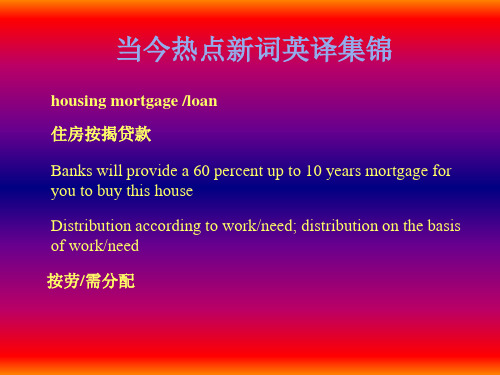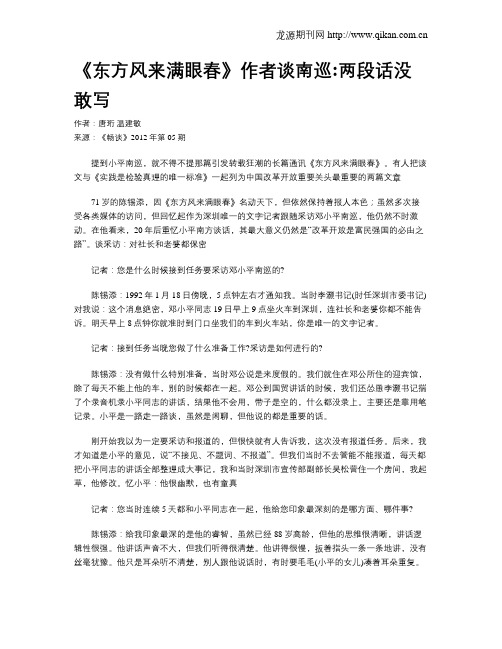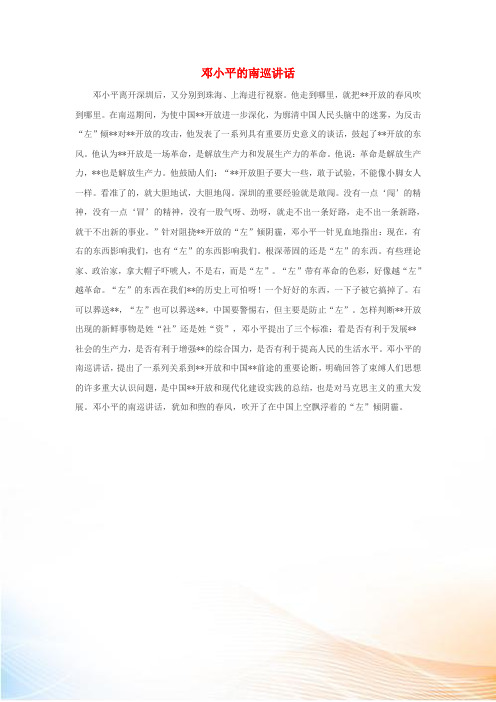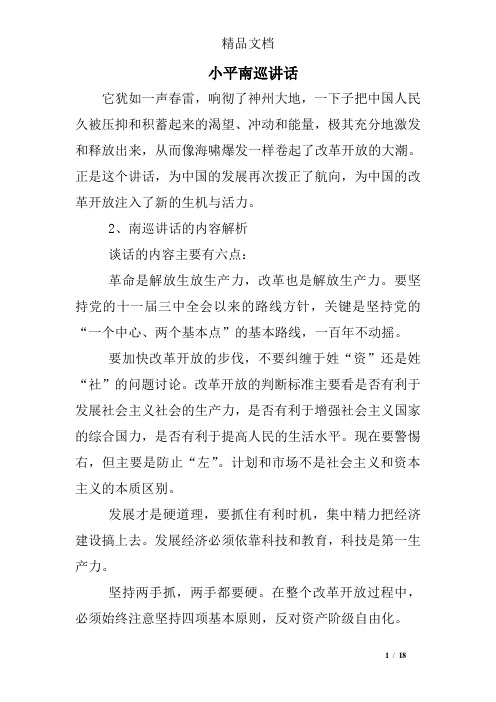南巡讲话翻译片段
南巡讲话 英语翻译

LOGO
• 5.alter(使)改变 ;更改;改动 to become different,to make sb/sth different • touch 移动,碰到,打(人)使受伤 to move sth,especially in such way that you damage it ;to hit or harm sb
LOGO
• 4.一变就人心不安,人们就会说中央的政策 变了。 Any change in that system might cause unease among the people, who would assert that Party Central Committee had altered its policy. Any change in that system would cause concern among the people, who would say that the Central Committee had altered its policy.
At that time,many people felt uncomfortable with this man who made a profit of 1 million Yuan.They called for a struggle against him. Many people felt uncomfortable with this man who had made a profit of 1 million yuan. They called for action to be taken against him.
闫作雁,杨兰君, 闫作雁,杨兰君,杨娜娜
邓小平南巡讲话
LOGO
南巡讲话 英语翻译

LOGO
• 4.得不偿失
• the loss would outweigh the gain. Outweigh:to be greater more important than sth 重于;大于;超过 eg.The advantages far outweigh the disadvantages.利远大于弊
LOGO
• 4.一变就人心不安,人们就会说中央的政策 变了。 Any change in that system might cause unease among the people, who would assert that Party Central Committee had altered its policy. Any change in that system would cause concern among the people, who would say that the Central Committee had altered its policy.
LOGO
• 5.alter(使)改变 ;更改;改动 to become different,to make sb/sth different • touch 移动,碰到,打(人)使受伤 to move sth,especially in such way that you damage it ;to hit or harm sb
好词及短语
LOGO
• 1.suffice to suffice (it) to say that... used to suggest that although you could say more, what you would say will be enough to explain what you mean. 无需多说,只需说...就够了
当今热点新词英译集锦时事英语翻译

The Eight-Point Proposal(put forward on January 30 1995 by Chinese President Jiang Zemin on developing cross-straits relations and promoting the peaceful reunification)
bowling alleys 保龄球馆
blind alleys 死胡同 moisturizing face cream/mousse 保湿面霜/摩丝
At present, the Lujiazui Financial and Trade Zone, Jinqiao Export Processing Zone, Waigaoqiao Bonded Zone and Zhangjiang High-tech Park have all embarked on the stage of functional development.
bounder/parvenu/overnight millionaire/vulgarian 暴发户 make something public/expose/reveal
Give public exposure to graft and corruption.
对渎职和腐败等行为给予公开暴光 Yield an unexpected result/produce an unexpected/a long-shot winner 爆冷门 上周的英超足球赛中米德尔斯堡爆冷打败了曼联。 Middlesbrough yielded an unexpected result by defeating Manchester United in last week’s Premiership football match in England. force somebody into a draw/tie 逼和、逼平
引语口译

温家宝总理上任的记者招待会 林则徐:“苟利国家生死已,岂因祸福趋避之” I shall serve my country till the end of my life, regardless of fortunes or misfortunes.
天时不如地利,地利不如人和。
Opportunities vouchsafed by Heaven are outmatched by terrestrial advantages, which in turn are outmatched by the harmony among people.
IV. 引 语 口 译
1992江泽民英国剑桥大学演讲,‚中华民族历来尊重人的尊严和价值,还在 遥远的古代,我们的先人就已提出‘民为贵’的思想,认为 ‘天生万物,
唯人为贵’,一切社会的发展和进步,都取决于人的发展和进步,取决
于人的尊严的维护和价值的发挥。‛
Man is the most valuable among all the things that heaven fosters.
引语口译 Interpreting Quotations
古今名人经典名句:
有朋自远方来,不亦乐乎。 It is such a delight to have friends coming from afar. 锲而不舍,金石可镂。 If you carve without a break, even metal and stone can be engraved. 欲穷千里目,更上一层楼。 We widen our views three hundred miles by ascending one flight of stairs. 天行健,君子以自强不息。 As Heaven‟s movement is ever vigorous, so must a gentleman ceaselessly strive along.
《东方风来满眼春》作者谈南巡两段话没敢写

《东方风来满眼春》作者谈南巡:两段话没敢写作者:唐珩温建敏来源:《畅谈》2012年第05期提到小平南巡,就不得不提那篇引发转载狂潮的长篇通讯《东方风来满眼春》。
有人把该文与《实践是检验真理的唯一标准》一起列为中国改革开放重要关头最重要的两篇文章71岁的陈锡添,因《东方风来满眼春》名动天下,但依然保持着报人本色;虽然多次接受各类媒体的访问,但回忆起作为深圳唯一的文字记者跟随采访邓小平南巡,他仍然不时激动。
在他看来,20年后重忆小平南方谈话,其最大意义仍然是“改革开放是富民强国的必由之路”。
谈采访:对社长和老婆都保密记者:您是什么时候接到任务要采访邓小平南巡的?陈锡添:1992年1月18日傍晚,5点钟左右才通知我。
当时李灏书记(时任深圳市委书记)对我说:这个消息绝密,邓小平同志19日早上9点坐火车到深圳,连社长和老婆你都不能告诉。
明天早上8点钟你就准时到门口坐我们的车到火车站,你是唯一的文字记者。
记者:接到任务当晚您做了什么准备工作?采访是如何进行的?陈锡添:没有做什么特别准备,当时邓公说是来度假的。
我们就住在邓公所住的迎宾馆,除了每天不能上他的车,别的时候都在一起。
邓公到国贸讲话的时候,我们还怂恿李灏书记揣了个录音机录小平同志的讲话,结果他不会用,带子是空的,什么都没录上。
主要还是靠用笔记录。
小平是一路走一路谈,虽然是闲聊,但他说的都是重要的话。
刚开始我以为一定要采访和报道的,但很快就有人告诉我,这次没有报道任务。
后来,我才知道是小平的意见,说“不接见、不题词、不报道”。
但我们当时不去管能不能报道,每天都把小平同志的讲话全部整理成大事记,我和当时深圳市宣传部副部长吴松营住一个房间,我起草,他修改。
忆小平:他很幽默,也有童真记者:您当时连续5天都和小平同志在一起,他给您印象最深刻的是哪方面、哪件事?陈锡添:给我印象最深的是他的睿智,虽然已经88岁高龄,但他的思维很清晰,讲话逻辑性很强。
他讲话声音不大,但我们听得很清楚。
改革开放30年经典热词英语翻译

改革开放30年经典热词英语翻译-时政类一国两制One Country, Two SystemsAn idea formally put forward by Deng Xiaoping, then leader of China, in the early 1980s to reunify the country.Deng suggested that there should only be one China, but the regions of Hong Kong, Macao and Taiwan, once reunified with the rest of the country, could retain their original economic and political systems while other parts keep pursuing socialism.This arrangement was observed when the country resumed sovereignty over Hong Kong and Macao in 1997 and 1999 respectively. The two cities are now the special administrative regions of the country with a high degree of autonomy.The central government has also proposed the idea to the Taiwan authorities to speed up the reunification of China.三通Three Direct LinksShorthand for direct links in post, transportation and trade between the Chinese mainland and Taiwan. Direct communication across the Taiwan Straits in most social and economical terms virtually stopped after the Kuomintang forces retreated to Taiwan in 1949. And the contacts, if any, were routed through intermediate places, mainly Hong Kong and Macao.In the early 1980s, the central government appealed to the Taiwan authorities for opening "three links". The latter has consistently refused, but had to make concessions in the face of growing cross-Straits exchanges. "Three mini-links" was opened in 2001 between Fujian Province and the islands of Jinmen and Matsu in Taiwan. Cross-Straits charter flights were approved in 2003 for the Lunar New Year and the flights were arranged in 2006 for three other traditional Chinese festivals.和谐社会A Harmonious societyA blueprint for social development featuring decent living standards for the majority of people, a tolerant society and peaceful coexistence between the human society and nature.The concept was first floated in 2004 and then amplified in October 2006, when the Party set specific goals for building a harmonious society by 2020. The goals range from fostering the rule of law, substantial protection for private property, developed public services to foster creativity and more efficient use of resources.Stemming from ancient Chinese ideas about harmony, the blueprint underlines the need to fine tune relations between different social entities. The idea also appears in the country's foreign policy, particularly its call for "a harmonious world".大部制Super-Ministry SystemA very recent idea to restructure central government offices so that ministries, commissions and departments of the State Council with similar or overlapping functions can be merged into super-ministries. This scheme has been introduced in a reshuffle of the State Council approved by the National People's Congress in March to improve efficiency, reduce the cost of policy making and its execution, and straighten out problematic chains of command. Five super-ministries respectively overseeing industry, transport, housing and construction, human resources and the environment were established.Based upon the current changes, the central government vowed to undertake further administrative reforms in the future.三个代表Three RepresentsShorthand for the call that the Communist Party of China (CPC) provides insight and leadership for economic and cultural progress, and commit itself to public good.Former CPC General Secretary Jiang Zemin, who was credited with its creation, literally admonished his comrades to "represent the development trend of China's most advanced productive forces, the orientation of China's most advanced culture, and the fundamental interests of the overwhelming majority of the Chinese people".The theory is the result of deliberations of the CPC's third-generation leaders on legitimacy and Party-building. At the 16th CPC National Congress in 2002, it was formally written into the Party Constitution.科学发展观Scientific Outlook on DevelopmentA concept initiated by the 16th Central Committee of the Communist Party of China (CPC) in 2003. It stresses a comprehensive, balanced and sustainable development that is people-orientated. With priority on addressing the needs and protecting the rights of the people, the country will not only grow in economic terms, but also in political and cultural terms. The growth aims to bridge regional disparity, the urban-rural gap, protect resources, and the environment.This concept is the core of policies by the CPC's current leaders headed by Hu Jintao. At the 17th CPC National Congress in October 2007, it was formally included in the Party Constitution.双拥Double SupportShorthand for the administrative effort to enhance ties between the army and civilian communities. In essence, the expression means local governments and common people should support the army and give preferential treatment to the families of service people, particularly those killed while on the job, while soldiers should support the government and love the people.In connection with this effort, schools offer training programs to soldiers, while common people provide technological consultations and donate books and the use of other facilities to the army. In return, the army helps deal with natural disasters, major construction projects and other difficulties.保持党员先进性教育Campaign to Educate Party Members to Preserve Their Vanguard NatureA campaign by the Communist Party of China to educate its members to stick firmly to the principles of the Party and serve the people so as to keep the Party's vigor and leading role in the country.From January 2005 to June 2006, the country's 68 million Party members participated in the special education program. They refreshed their knowledge about the important theories of the Party at different periods, solidified their loyalty to the Party and improved the efficiency of the grass-root organizations of the Party in serving the people.和平共处五项原则Five Principles of Peaceful CoexistenceA set of norms governing relations between nations first raised by China. Put forward by then Premier Zhou Enlai in 1953 during negotiations between China and India, the five principles were originally meant to maintain friendly ties. Under the principles, both sides agreed to respect the territorial integrity and sovereignty of each other, not to invade the soil of each other, do not interfere in each other's internal affairs, the ties should be equally based, and mutually beneficial for the two countries to coexist peacefully.The five principles have been widely accepted in bilateral relations between China and many other countries. One of the corner stones of China's foreign policy, it has also become an important part in the law on international relationships.社会主义荣辱观Socialist Concept of Honor and DisgraceAn idea put forward to instill a value of moral standards among the pub lic, especially youngsters, in line with Chinese traditional values and modern virtues.The concept underscores the value of patriotism, consciousness of serving the people, belief in science, hard work, solidarity, honesty, observation of the law and plain living. It condemns the opposite of these virtues as disgraces.It was raised by Hu Jintao, general secretary of the Communist Party of China, in March 2006. And the concept is also known as "eight honors and eight disgraces" "三讲" 教育"Three Emphasis" EducationA campaign by the Communist Party of China (CPC) to remind Party officials to pay more attention to theoretical study, improve their political awareness, and be honest and upright.Jiang Zemin, then CPC general secretary, pointed out in November 1995 that Party officials should improve their self-education in the three aspects. And a national campaign was soon started among all Party officials. A conference was held in December 2000 which hailed the campaign as a success. CPC General Secretary Hu Jintao said the move had boosted the individual capabilities of Party members and the internal governance of the Party as well.党务公开Open Management of Party AffairsAn institutional arrangement for branches of the Communist Party of China (CPC) at all levels to improve transparency.According to this principle, Party branches are obliged to make their processes for making decisions and carrying out activities as well as their achievements known to other Party members according to the characteristics of the issues. And if the issues are closely related to the interests of the public, the Party branches should also publicize their work to all. Formally included in the CPC Constitution in 2007, this principle was part of the CPC's effort to promote democracy within the Party, protect the democratic rights of Party members and enhance the internal supervision of the Party.爱国统一战线Patriotic United FrontA political union of all socialist laborers, patriots supporting socialism and patriots supporting the unification of China.First raised as the "ethnic united front" in 1935 by the Communist Party of China (CPC), it was meant to join the powers of all social groups regardless of their class, wealth and political positions to fight against the Japanese aggressors during the World War II.Despite changes in the specific concept and target of the union under different historical conditions, this union has remained a key strategy of the CPC to mobilize all social sectors to achieve the contemporary goals it sets for the country.Part of institutional arrangements for the country to consolidate and develop the people's dictatorship, this union was embodied in the Chinese People's Political Consultative Conference, whose members include people from the CPC, the eight non-communist parties and other social groups.南巡讲话South Tour SpeechesA series of speeches delivered by the late leader Deng Xiaoping, the chief architect of China's reform and opening-up, during his inspection tour of southern Wuchang, Shenzhen, Zhuhai, and Shanghai in early 1992. Targeted at domestic misgivings and confusion among some scholars and even officials about the country's reform and development, Deng put forward some new viewpoints on a series of crucial issues, such as the core of Marxism, the essence of socialism, market economy, and how to emancipate and develop productivity. The significant speeches outlined an unequivocal path for the country's further re form and opening-up and have greatly driven its political, economic, and social development.实事求是To Seek Truth from FactsA term stressing that facts or practices are the single standard by which to judge whether a theory is valid. It is one of the core ideas of the Communist Party of China about socialism with Chinese characteristics. Repeatedly stressed by different generations of leaders, this term was formally raised by Deng Xiaoping in the late 1970s. It was to mobilize the country to look for means of development in economic and political terms feasible and suitable for China rather than those based on political ideology. It is still part of the principles for the CPC stipulated in its constitution. It is also a popular term extensively used in different aspects of social 与时俱进Keep Up With the TimesAn expression that has become popular in official documents and speeches, accentuating the need on the part of the Communist Party of China (CPC) to keep pace with the rapid changes that have taken place in society.First appearing in former President Jiang Zemin's speech commemorating the 80th anniversary of the CPC's founding on July 1, 2001, the expression was included as part of the theme for the Party's 16th National Congress in 2002. Under the principle, the Party vowed to adapt its ideology and work in tune with the latest developments in and out of the country to better serve the people.信访Letters and VisitsA special term referring to actions of citizens or institutions to give information, make comments or suggestions and lodge complaints to the special administrative department in charge of receiving them through various forms. Letters and visits from the grassroots were lauded by State leaders as having remarkable significance in enhancing ties between the government and the people. Individuals and institutions could write letters or pay visits to the relevant department when they have information about or want to complain about the performance of the administrative organization, enterprise or institutions supplying public services as well as about their staff members. Departments receiving letters and visits are required to process the information and complaints according to a State Council regulation first adopted in 1995 and revised in 2005.星火计划Spark ProgramA State effort to popularize modern technologies in the rural areas to stimulate rural development and raise the farmers' income. Started in 1986, the program offers support to technological projects easily applied and developed in rural areas, encourages factories and small businesses to develop these projects with incentives in several aspects, holds training courses in rural businesses and promotes agricultural technology among farmers. By 2006, local governments invested 14.3 billion yuan while the central government contributed 363.1 billion yuan to the program.以人为本Put People FirstAn idea of the Communist Party of China (CPC) stresses that boosting the people's interests and development are the purpose of the Party as well as the State. Formally raised during the third plenary session of the 16th CPC Central Committee in October 2003, this idea was tagged as the core of the scientific outlook of development by general secretary Hu Jintao in his report on the 17th CPC National Congress in 2007. As a ruling party, the CPC vowed to expand the people's interests, respect the people's position in political life, give play to their creativity and let them share the benefits of development.两岸直航包机Direct Chartere d Flight Across the Taiwan StraitsFlights between designated airports on the Chinese mainland and Taiwan during major Chinese festivals. Regular flights have been cut off between the two sides since 1949. In 2003, the Taiwan authorities allowed Taiwan airlines to fly Taiwan people living in the mainland with chartered flights from Shanghai for the Spring Festival. As a trust-building step, chartered flights were added in 2006 during three other holidays: Tomb Sweeping Day, the Dragon Boat Festival and the Mid Autumn Festival. Airlines from both sides were allowed and the flights stopped at four mainland cities and two Taiwan cities. Negotiations are underway to arrange the chartered flights weekly or even more frequently.基层群众自治制度System of Community Level Self-GovernanceA grassroots democratic system in which rural and urban citizens manage the public affairs in their organizations and communities. Composed of the villagers' committee in rural areas, neighborhood committee in urban areas and the conference of workers and staff in businesses, the system enables the members to carry out democratic elections, decision-making and supervision. An important part in the country's political democracy, it was stressed as a fundamental system to adhere to in improving the socialist political system by General Secretary Hu Jintao in his report to the 17th National Congress of the Communist Party of China in 2007.多党合作和政治协商制度System of Multi-party Cooperation and Political ConsultationA basic political system in China under which the Communist Party of China (CPC), as the party in power, consults all non-Communist parties and representatives of non-party personages to reach a common understanding before taking major decisions. Formally established in 1949 when New China was founded, the system is practiced through various forms. The two major forms are the Chinese People's Political Consultative Conference, of which non-Communist party members and non-party personages are members, and the consultative conferences attended by non-Communist parties and unaffiliated democrats who are invited by the CPC bodies at different 依法治国Rule of LawA fundamental principle of governance that stresses that the country should be administered in accordance with the law.It was formally raised as a fundamental principle in 1997 when former general secretary of the Communist Party of China (CPC) Jiang Zemin delivered his report to the 15th National Congress of the CPC. He stressed the principle should be fully observed as "socialist democracy is gradually institutionalized and codified so that such institutions and laws will not change with changes in the leadership or changes in the views or focus of attention of any leader."This principle was reiterated by General Secretary Hu Jintao during the 17th CPC National Congress in 2007.民主集中制Democratic CentralismA principle of organization in the Communist Party of China (CPC) as well as in the country's political life, stressing both democracy and centralism. Enunciated originally by Vladimir Lenin, the principle stresses that the Party members have the freedom to discuss and debate matters of policy and direction, but must support the final decision once it is reached through a majority vote. Individuals must obey the Party or the organization, the minority must obey the majority, the lower levels of organizations must obey the ones at the upper level. It is one of the most important principles adopted by the CPC at its early stage and is upheld till now.政企分开SeparateGovernment Functions from Enterprise ManagementAn effort to draw a clear line between the roles of the administration and of the businesses. Under the planned economy, the extensive involvement of the government in economic operations resulted in the government making commercial decisions for the businesses and the State-owned enterprises offering public services to their employees, ranging from medical care to education. Since the country introduced the economic reform, it became a major mission for the government to separate the functions of the administration from those of the enterprises in order to improve the efficiency of both.农转非Change From Rural Residents to Urban ResidentsA change in the residential status of people under the household registration system.Since the household registration system was established in the 1950s, residents were put into two categories, urban and rural, according to where they lived. While urban residents enjoyed relatively better social security as industrial workers, rural residents had to depend on farming for a living. Rural people could obtain urban registration under special circumstances, like entering universities or becoming army officers. This was difficult to achieve, but viewed as a quick way to a better life, especially in the 1970s and 1980s.As the country began to reform, so did the household registration system. The supply of commodities became more abundant on the market, and the difference in welfare of urban and rural residents was narrowed.863计划863 ProgramA government program to stimulate the development of advanced technologies. The figure "863" comes from the fact that it was created in the third month of 1986.Approved by former leader Deng Xiaoping, the program aims at lifting China's own efforts in scientific and technology research as well as in commercializing the benefits of the research. The program's specific plan gives preference to research in biology, information technology, astronautics, laser technology, automation, energy technology, and new materials.A milestone in the history of scientific progress, the program has boosted China's independent research capability, laying a solid foundation for economic and social growth.。
南巡讲话

时代背景
九十年代,苏联解体、东欧剧变, 九十年代,苏联解体、东欧剧变,偌大 的一个社会主义大家庭,倾刻间不战自溃, 的一个社会主义大家庭,倾刻间不战自溃, 纷纷倒旗落马。严峻的事实发人深思: 纷纷倒旗落马。严峻的事实发人深思:今 后世界向何处去?社会主义命运将会如何? 后世界向何处去?社会主义命运将会如何? 中国今后怎么办? 中国今后怎么办?
——1992年邓小平南巡讲话 年邓小平南巡讲话
1992年初,邓小平先后到武昌、深圳、珠海、上海等地视 年初,邓小平先后到武昌、深圳、珠海、上海等地视 年初 武昌 察,并发表了一系列重要讲话,通称南巡讲话。 并发表了一系列重要讲话,通称南巡讲话。 讲话针对人们思想中普遍存在的疑虑,重申了深化改革、 讲话针对人们思想中普遍存在的疑虑,重申了深化改革、 加速发展的必要性和重要性,并从中国实际出发, 加速发展的必要性和重要性,并从中国实际出发,站在时代 的高度,深刻地总结了十多年改革开放的经验教训, 的高度,深刻大的理论和实践问题上,提出了新思路,有了新突破, 列重大的理论和实践问题上,提出了新思路,有了新突破, 将建设有中国特色社会主义理论大大地向前推进了一步。 将建设有中国特色社会主义理论大大地向前推进了一步。 这个讲话标志着继毛泽东思想之后, 这个讲话标志着继毛泽东思想之后,马克思主义与中国实 际相结合的第二次伟大历史性飞跃的思想结晶———邓小平 际相结合的第二次伟大历史性飞跃的思想结晶 邓小平 理论的最终成熟和形成。 理论的最终成熟和形成
计划多一点还是市场多一点,不是社会主 划多一点还是市场多一点, 义与资本主义的本质区别。 义与资本主义的本质区别。计划经济不等于 社会主义,资本主义也有计划; 社会主义,资本主义也有计划;市场经济不 等于资本主义,社会主义也有市场, 等于资本主义,社会主义也有市场,计划和 市场都是经济手段。社会主义的本质, 市场都是经济手段。社会主义的本质,是解 放生产力,发展生产力,消灭剥削, 放生产力,发展生产力,消灭剥削,消除两 极分化,最终达到共同富裕。 极分化,最终达到共同富裕。
邓小平南巡在深圳的讲话(1992年1月19日)

邓小平南巡在深圳的讲话(1992年1月19日)邓小平南巡在深圳的讲话(1992年1月19日)李灏汇报说,这些年来,除个别年份外,深圳的发展速度都很快,平均增长超过20%。
利用外资情况也比较好,国有经济和其他经济成分增长也很快。
小平同志问外资在经济总量中占多大比重,李灏回答说,约占25%。
在总量中不到四分之一。
邓小平听后频频点头。
他说:“对办特区,从一开始就有不同意见,担心是不是搞资本主义。
深圳的建设成就,明确回答了那些有这样那样担心的人。
特区姓'社’不姓'资’。
从深圳的情况看,公有制是主体,外商投资只占四分之一,就是外资部分,我们还可以从税收、劳务等方面得到益处嘛!多搞点'三资’企业,不要怕。
只要我们头脑清醒,就不怕。
我们有优势,有国营大中型企业,有乡镇企业,更重要的是政权在我们手里。
有的人认为,多一分外资,就多一分资本主义,'三资’企业多了,就是资本主义的东西多了,就是发展了资本主义。
这些人连基本常识都没有。
”邓小平问谢非,广东省多少人口,谢非回答说,有6300万人,面积178万平方公里。
邓小平说,亚洲“四小龙”发展很快,你们发展也很快。
广东要力争用20年的时间赶上亚洲“四小龙”。
停了一会,他补充说:“不仅经济要上去,社会秩序、社会风气也要搞好,两个文明建设都要超过他们,这才是有中国特色的社会主义。
新加坡的社会秩序算是好的,他们管得严,我们应该借鉴他们的经验,而且比他们管得更好。
”邓小平认为,在市场经济方面,香港、新加坡做得好,我们要向他们学习。
他说,社会主义要赢得与资本主义相比较的优势,就必须大胆吸收和借鉴人类社会创造的一切文明成果。
吸收和借鉴当今世界各国包括资本主义发达国家的一切反映现代社会化生产规律的先进经营方式、管理方法。
在参观市容的途中,李灏在汇报深圳市经济发展的情况时说,深圳这几年之所以发展得很快,主要得益于对外开放。
我们不仅从国外引进资金、技术和管理经验,我们进行的土地有偿使用、发展股份制、建立证券市场,以及公务员制度和廉政建设等许多改革和做法,也是借鉴了香港和国外的经验。
邓小平南巡讲话的语言艺术

3分)
短语中的7节数为6/4/8/7/7/7
/6/4o在
语中14/6/7/-7节短
语
i 为 数词是7
节的i短语几乎不能超过-个7节。
但是在现 语中i 为 数
词是7节的i所以 4/6/7/-7
节短语
i
的短语
在讲中
o
7节数量的
是为开始
一个
或得结o 节中引
的 个例子以 语中
是 在 的开或结
尾。在 演讲中i
在。
关键词:南巡讲话 言语形式 修辞手法
!.南巡讲话背景
自20世纪50年代以来,在经历 了三十年低效的计划经济和十年的
混乱社会秩序之后,中国共产党在
1978年底决定改革并将中国经济 从封闭的中央计划经济转变为开放
的市场经济。这种经济、政治和社会
生活的"改革开放"由邓小平(邓小
平,1904-1997 )领导,他因此被称
音节o以句子(ii)为例: (%%)不坚持社会主义i不改革开
放i不发展经济i不改善人民生活i
只能是死路一条。
短语中的咅节数量为7/5/5/7
/7。我们再看另一个例子:
(%v)如果分析不当i造成误解i 就会变得谨小慎微i不敢解放思想i 不敢放开手脚i结果是丧失时机i犹 如逆水行舟i不进则退。(讲话的第
外向型经济i就没有什么以担心
非常
的国中语言和文化
的
°)
3.2
南巡讲话中
用了 种
i
平行、
、
、
用、 、渐进°如i下面的句子
中用 的
(|)这 就乱i乱
i
内° (讲话的〔部
分)
有这
格 用于 他语
关于南巡讲话的感想

关于南巡讲话的感想第一篇:关于南巡讲话的感想关于“南巡讲话”的一些感想八十年代末期,九十年代初,不论是国内时事,还是世界格局都发生了令人震惊的变化。
也就在这时,人们的思想再一次出现困惑,看着机会不敢闯,怕改姓“资”,怕“和平演变”;是继续坚持以经济为中心“一个中心,还是以阶级斗争为主的问题困扰着党。
就在这中国人彷徨迷惘的时候,年已88岁的邓小平毅然南巡。
南巡期间可以说讲话不断,而这一系列的讲话正起到了为中国指明方向的作用,给了那些看准机会的人以“闯”的精神。
二十多年后的今天,回望往事,问们依旧被这位伟大领导人的智慧与胆气所折服。
南巡讲话是指1992年1月18日至2月21日,邓小平南巡武昌、深圳、珠海、上海等地接连发表的一系列重要讲话。
其中主要包括以下六点:(一)要坚持党的十一届三中全会以来的路线方针政策,关键是坚持“一个中心、两个基本点” 的基本路线,一百年不动摇。
(二)改革开放胆子要大一些,敢于试验,不能像小脚女人一样。
看准了的,就大胆地试,大胆地闯。
(三)抓住时机,发展自己,关键是发展经济。
展经济必须依靠科技和教育,科技是第一生产力。
(四)要坚持两手抓,一手抓改革开放,一手抓打击各种犯罪活动。
这两只手都要硬,反对资产阶级自由化。
(五)正确的政治路线要靠正确的组织路线来保证。
要注意培养人,要反对形式主义,按照“四化”标准选拔人才进入领导层。
(六)世界上赞成马克思主义的人会多起来的,因为马克思主义是科学。
“一个中心”即经济建设为中心,“两个基本点”即坚持四项基本原则、坚持改革开放。
“要坚持党的基本路线不动摇”,这是谈话的灵魂所在。
有了稳固的路线方针才有可能快速正确的发展。
邓小平也指出:“当然,随着实践的发展,该完善的完善,该修补的修补,但总的要坚定不移。
”“发展才是硬道理”这句至今时髦的话也出自南巡讲话。
邓小平说:“要注意济经稳定、协调地发展,但稳定和协调也是相对的,不是绝对的。
发展才是硬道理。
高中历史 第五章 伟大的无产阶级革命家 5.4 邓小平的南巡讲话文本素材 北师大版选修4

邓小平的南巡讲话邓小平离开深圳后,又分别到珠海、上海进行视察。
他走到哪里,就把**开放的春风吹到哪里。
在南巡期间,为使中国**开放进一步深化,为廓清中国人民头脑中的迷雾,为反击“左”倾**对**开放的攻击,他发表了一系列具有重要历史意义的谈话,鼓起了**开放的东风。
他认为**开放是一场革命,是解放生产力和发展生产力的革命。
他说:革命是解放生产力,**也是解放生产力。
他鼓励人们:“**开放胆子要大一些,敢于试验,不能像小脚女人一样。
看准了的,就大胆地试,大胆地闯。
深圳的重要经验就是敢闯。
没有一点‘闯’的精神,没有一点‘冒’的精神,没有一股气呀、劲呀,就走不出一条好路,走不出一条新路,就干不出新的事业。
”针对阻挠**开放的“左”倾阴霾,邓小平一针见血地指出:现在,有右的东西影响我们,也有“左”的东西影响我们。
根深蒂固的还是“左”的东西。
有些理论家、政治家,拿大帽子吓唬人,不是右,而是“左”。
“左”带有革命的色彩,好像越“左”越革命。
“左”的东西在我们**的历史上可怕呀!一个好好的东西,一下子被它搞掉了。
右可以葬送**,“左”也可以葬送**。
中国要警惕右,但主要是防止“左”。
怎样判断**开放出现的新鲜事物是姓“社”还是姓“资”,邓小平提出了三个标准:看是否有利于发展**社会的生产力,是否有利于增强**的综合国力,是否有利于提高人民的生活水平。
邓小平的南巡讲话,提出了一系列关系到**开放和中国**前途的重要论断,明确回答了束缚人们思想的许多重大认识问题,是中国**开放和现代化建设实践的总结,也是对马克思主义的重大发展。
邓小平的南巡讲话,犹如和煦的春风,吹开了在中国上空飘浮着的“左”倾阴霾。
张唐之先生在“南巡”时候的讲话

写这篇短文的时候,心中是反复考量过的,原因有两个:一是我不是研究六合或张先生的专家,二是张先生的“堂丝”太多,我怕板砖。
但饲料行业发展到了今天,许多企业已到了十字路口。
而张先生的带病复出,更是饲料行业的一大新闻。
我这人生来胆大,如今戴上头盔也就什么都不怕了。
我最喜欢说的一句话:“既然河上面有桥,何必摸着石头过河”?张先生现在的“亚太中惠”和过去的“六合”都是值得借鉴的案例,不过,可不要照搬照套啊。
下面是张先生在“南巡”时候的讲话,我这一评,其实就是据此文而评了。
(引原文如下)1、农业的根本出路在于提高从业人员的素质。
饲料工业为什么能与世界接轨,就是因为改变了从业人员的素质。
而现在从事农业的是一帮穷人,他们既没有知识又没有能力,这样的农民只能去干加工业,出卖劳动力。
农业的落后是封建等级制度的影响和小农经济思想的影响。
2、要以价值为核心,不要以质量为核心,特别是原料的价值在原料上,在配方上,要做到:⑴杂粕代替豆粕;⑵一切含有能量的原料都可以代替玉米;⑶一切含有蛋白质的原料都可以代替豆粕,或者代替部分鱼粉;总的来说,服务代替营销。
是一个重大的观念转变。
尽量减少高价格的原料,尽量减少鱼粉的用量,尽量减少豆粕的用量。
用废油代替好油。
一切按价格规律做事,一切为了降低饲料成本。
少讨论销售技巧,中国很喜欢心灵手巧,我认为手可以巧,心巧就不行了,就会急功近利。
一个人或一个企业急功近利,唯利是图就坏了。
所以,要符合市场经济规律,不断创新,不断降低成本。
赚钱靠机会,省钱靠能力。
3、饲料行业发展的几个趋势⑴散装代替包装;⑵杂粕代替豆粕;⑶粉料代替颗粒料;⑷服务代替营销;⑸饲料厂是养殖业的车间;⑹中小型企业与别人合作是未来的发展方向。
大型企业可以走多元化道路,中小企业不可以走这条道路,出路就是搞养殖。
现在的农民不能搞养殖,因为养殖于要求标准化,专业化和规范化,而农民做不到。
4、一群人都可以分成三类:精明人:以自我为中心,靠相互竞争,占95%以上聪明人:靠强化学习,占4~4.5%明白人:要靠修炼,靠合作,合作是明白人的责任,占0.5%左右,少之又少!奇缺,这个社会要靠明白人去改变。
邓小平南巡讲话讲话

2· 国内背景 国人开始质疑经济特区到 底姓“社”,还是姓 “资”。甚至有些人提出 中国的改革到底要不要进 行下去,中国的改革如果 进行下去,中国会不会也 走上资本主义道路?在这 种情况下,南北人心都很 惶惑。在这情况下,邓小 平进行的南巡讲话。
三。谈话内容
(一)革命是解放生产力,改 革也是解放生产力。社会主义 基本制度确立以后,还要从根 本上改变束缚生产力发展的经 济体制,建立起充满生机和活 力的社会主义经济体制,促进 生产力的发展,这是改革,所 以改革也是解放生产力。 要坚持党的十一届三中全 会以来的路线、方针、政策, 关键是坚持“一个中心、两个 基本点”。
(二)改革开放胆子要大一些,敢于试验,不能像小脚女人一样。 看准了的,就大胆地试,大胆地闯。 改革开放迈不开步子,不敢闯,说来说去就是怕资本主义的东 西多了,走了资本主义道路。要害是姓“资”还是姓“社”的问题。 判断的标准,应该主要看是否有利于发展社会主义社会的生产力, 是否有利于增强社会主义国家的综合国力,是否有利于提高人民的 生活水平。 计划多一点还是市场多一点,不是社会主义与资本主义的本质 区别。社会主义的本质,是解放生产力,发展生产力,消灭剥削, 消除两极分化,最终达到共同富裕。 走社会主义道路,就是要逐步实现共同富裕。共同富裕是指一 部分地区有条件先发展起来,一部分地区发展慢点,先发展起来的 地区带动后发展的地区,最终达到共同富裕。
四。个人感悟
首先是他打破人们对改革开放 的顾虑。 二是他阐明了社会主义的本质, 要加快改革开放的步 伐,不要纠缠于姓“资”还是 姓“社”的问题讨论。 三是他提出了时不我待,抓住 机遇发展的这一观点。 四是他提出了发展就是硬道理 的这一真知灼见 五是他提出了正确的政治路线 和人在国家政治、经济、社会 的关键性 六是他提出的“与时俱进,活 学活用。”是我们学习、办事 很好的行动指南。
小平南巡讲话

小平南巡讲话它犹如一声春雷,响彻了神州大地,一下子把中国人民久被压抑和积蓄起来的渴望、冲动和能量,极其充分地激发和释放出来,从而像海啸爆发一样卷起了改革开放的大潮。
正是这个讲话,为中国的发展再次拨正了航向,为中国的改革开放注入了新的生机与活力。
2、南巡讲话的内容解析谈话的内容主要有六点:革命是解放生放生产力,改革也是解放生产力。
要坚持党的十一届三中全会以来的路线方针,关键是坚持党的“一个中心、两个基本点”的基本路线,一百年不动摇。
要加快改革开放的步伐,不要纠缠于姓“资”还是姓“社”的问题讨论。
改革开放的判断标准主要看是否有利于发展社会主义社会的生产力,是否有利于增强社会主义国家的综合国力,是否有利于提高人民的生活水平。
现在要警惕右,但主要是防止“左”。
计划和市场不是社会主义和资本主义的本质区别。
发展才是硬道理,要抓住有利时机,集中精力把经济建设搞上去。
发展经济必须依靠科技和教育,科技是第一生产力。
坚持两手抓,两手都要硬。
在整个改革开放过程中,必须始终注意坚持四项基本原则,反对资产阶级自由化。
正确的政治路线要靠正确的组织路线来保证,要注意培养人,按照“四化”标准选拔人才进入领导层。
要反对形式主义,学马列要精,要管用。
坚持社会主义信念,社会主义在经历了一个曲折的发展过程后必然代替资本主义,这是历史发展的总趋势。
3、南巡讲话引起的反响本土:“邓旋风”掀起改革开放大潮1992年3月26日,《深圳特区报》头版头条刊出了长篇通讯《东方风来满眼春》,邓小平南巡第一次正式公之于众。
3月30日,新华社全文播发《东方风来满眼春》。
3月31日,《人民日报》等国内各主要报纸都在头版主要位置转载《深圳特区报》的这篇长篇通讯;中央电视台也在当晚《新闻联播》之后,用45分钟时间全文播发了这篇文章。
从这时开始,神州大地上刮起了一股“邓旋风”。
外媒:中国正在迎来改革开放的第二个新高潮国外各大通讯社和其他主要媒体发表了大量的有关消息和评论。
关于南巡讲话关于解放思想

关于南巡讲话关于解放思想南巡讲话是指1992年春江苏南、浙江南、福建东南、广东珠三角等地的视察和讲话。
这次南巡讲话成为中国改革开放进程中的一个重要事件,特别是关于解放思想的论述更是成为中国改革开放政策的核心。
解放思想,正如南巡讲话中所述,是中国改革开放前进的根本动力。
改革开放以来,我国深入实施了改革开放政策,推动经济发展,改善民生和国家政治架构。
然而,在推进改革开放和实现现代化的过程中,长期以来却受到了诸多思想观念的束缚,其中包括传统观念、禁锢思想、体制约束和行政官僚主义等。
这些固有的思维模式成为了阻碍改革进程的瓶颈,这也就迫使我国领导人寻找一种新的道路,以走出这个僵局。
邓小平同志提出“解放思想,从实际出发”的口号,就是在这种背景下提出的。
解放思想,指的是摆脱束缚思想和定式思维的束缚,主动思考问题解决问题。
从实际出发,则是指在国情和实际情况的基础上,积极探索实践经验,寻求符合中国国情的改革开放之路。
南巡讲话的核心思想就是要进一步解放思想,在实践中探索出更符合中国国情的社会主义道路。
邓小平同志在南巡讲话中提出要“敢想敢干”,鼓励各级干部敢于从固有的思维模式中走出来,大胆尝试,勇于创新。
他还强调要坚持实践的主体性,发扬以往优良传统和艰苦奋斗精神,提高实践创新的能力和水平。
南巡讲话对中国发展产生了深远的影响。
一方面,解放思想给中国改革开放带来了新的动力,推动了我国在改革开放初期经济、科技、文化、教育等领域的了创新和提高。
另一方面,南巡讲话的启发也促进了中国在改革中走出了许多难题,如企业私有化、劳动力市场改革等,走出了自己的发展道路。
总之,南巡讲话中的关于解放思想的思想,给中国发展带来了新的机遇,也为当前中国发展提供了参考和借鉴。
在今天,我们也需要在新的发展道路中继续发扬“敢想敢干,敢做敢为”的诚信精神,在不断弘扬民族精神的同时,更多地向前看,开拓创新。
邓小平南巡讲话20周年

南巡意义
• 邓小平视察南方的重要讲话分析了当时的国际国 内形势,科学地总结了党的十一届三中全会以来 改革开放和现代化建设的基本实践和基本经验, 进一步阐明了改革开放的重大意义,阐述了建立 社会主义市场经济理论的基本原则,从理论上深 刻回答了长期困扰和束缚人们思想的许多重大认 识问题,是把改革开放和现代化建设推向到新阶 段的又一个解放思想、实事求是的宣言书。这对 我国的改革开放和社会主义现代化建设具有重大 而深远的意义。
• 这样的观点,在今天,已经成为从中央到地方、 社会各界的广泛共识,这也同样昭示了今天科学 发展观的形成和确立。我们要在建设有中国特色 的社会主义道路上继续前进。
南巡总结
以前大家不断在姓“资”还是姓“社”问题 上纠缠,其实现在看来邓小平同志在对待这个问 题上的态度给了大家很好的启示。在小平同志的 指导思想下,中国部分人是实现了富裕,在这个 时候,中国是姓“资”还是姓“社”的问题可能 又冒了疑。其实大可不必。我们现在 在对待这个问题上,我觉的还是应该想当时邓小 平对待“傻子”瓜子问题一样。现在出现的暂时 的贫富差距是在通向共同富裕的道路上的必经阶 段。让我们大家卯足干劲,全力奋斗,为实现中 华民族的伟大复兴奋斗吧。
读《邓小平南巡讲话》之感悟
读完邓小平1992年1月18日到2月21南 巡时的讲话,我突然想起恩格斯说过的一 句话:“一个知道自己的目的,也知道怎 样达到这个目的的政党,一个真正想达到 这个目的并且具有达到这个目的所必不可 缺的顽强精神的政党,是不可战胜的。” 回顾中国共产党的历史,就会发现我们党 为这句话付出过多么巨大的代价,也因这 句话而取得了多么辉煌的胜利。
• 第五站,江西鹰潭 • 办事情正确与否“主要看是否有利于发展 社会主义社会的生产力,是否有利于增强 社会主义国家的综合国力,是否有利于提 高人民的生活水平”,“低速度就等于停 步,甚至等于后退”。
1992邓小平南巡内幕揭秘

1992邓小平南巡内幕揭秘
凌志军
【期刊名称】《档案与社会》
【年(卷),期】2008(000)006
【摘要】皇甫平的评论文章激起了大批判。
熟知内情的人相信,它的矛头“实际是在批邓”,这时己不是毛泽东的晚年时代。
而是改革开放12年后
【总页数】6页(P9-14)
【作者】凌志军
【作者单位】不详
【正文语种】中文
【中图分类】A849
【相关文献】
1.最困难的时候小平来了!——邓小平1992年南巡见证者梁广大的回忆 [J], 田炳信
2.1992年邓小平南巡剪影 [J], 陈锦泉
3.1992年邓小平南巡讲话摘要 [J],
4.文体学理论在翻译中的应用——评《邓小平1992年南巡谈话》的两个英译本[J], 赵峰
5.坚定不移地将改革开放进行到底——邓小平1992年南巡回眸 [J], ;
因版权原因,仅展示原文概要,查看原文内容请购买。
- 1、下载文档前请自行甄别文档内容的完整性,平台不提供额外的编辑、内容补充、找答案等附加服务。
- 2、"仅部分预览"的文档,不可在线预览部分如存在完整性等问题,可反馈申请退款(可完整预览的文档不适用该条件!)。
- 3、如文档侵犯您的权益,请联系客服反馈,我们会尽快为您处理(人工客服工作时间:9:00-18:30)。
这五年,共创造工业总产值6万多亿元,平均 每年增长21.7%。
During those five years, the gross value of industrial product was created to more than 6 trillion yuan totally, and increased by an average of 21.7 percent a year.
经济“过热”,确实带来一些问题。比如,票子 发得多了一点,物价波动大了一点,重复建设比 较严重,造成了一些浪费。
The overheated economy did pose some problems. For instance, mass-produced currency resulted in unstable price fluctuation; grave reconstruction caused some waste.
钢材、水泥等生产资料也大幅度增长。
ቤተ መጻሕፍቲ ባይዱ
It was the same situation for the production of capital goods ,such as rolled steel and cement.
农业和工业,农村和城市,就是这样相互影响、相 互促进。
The agriculture and industry, also the rural and urban areas influenced and promoted in a way of interaction.
吃、穿、住、行、用等各方面的工业品,包括彩 电、冰箱、洗衣机,都大幅度增长
The industrial products of food, clothing, shelter, and means of travel— basic necessities of life , including color TV, refrigerators, washing machines, had increased dramatically.
The influences and promotion between rural and urban ares, agriculture and industry were in a interactive way.
可以说,这个期间我国财富有了巨额增加,整 个国民经济上了一个新的台阶。
It can be said that our nation witnessed a greatly increase in national wealth, and the whole national economy rose to a new stage during these period.
这是一个非常生动、非常有说服力的发展过程。
This is a vivid and convincing developing process.
89年开始治理整顿。治理整顿,我是赞成的, 而且确实需要。
In 1989, we began to improve the economic environment and rectify the economic order, in fact , which I endorsed and our country really needed .
